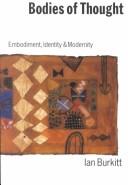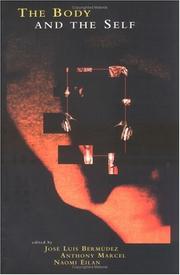| Listing 1 - 10 of 10 |
Sort by
|

ISBN: 1135963991 0203906497 0203905253 1280316977 9780203906491 9780203905258 9780415915854 0415915856 9780415915861 0415915864 9786610316977 661031697X 9781135963996 9781280316975 9781135963941 9781135963989 1135963983 Year: 1999 Publisher: New York Routledge
Abstract | Keywords | Export | Availability | Bookmark
 Loading...
Loading...Choose an application
- Reference Manager
- EndNote
- RefWorks (Direct export to RefWorks)
The essays included here offer several different perspectives on what it means to be embodied in the late 20th century. Despite differences in approach, methodology, subject matter, and style, these perspectives are united in their attempt to break down the binary opposition between nature and culture that has all too often been symbolized and reinforced by an association of the body with nature and consciousness with culture.
Body image --- Body schema --- Body percept --- Percept, Body --- Schema, Body --- Schemas (Psychology) --- Somesthesia --- Image, Body --- Imagery (Psychology) --- Mind and body --- Person schemas --- Personality --- Self-perception --- Human body --- Congresses
Book
ISSN: 1381589X ISBN: 9789027251985 9027251983 9781588116390 1588116395 9786612156694 1282156691 9027294402 9789027294401 Year: 2005 Volume: v. 62 Publisher: Amsterdam Benjamins
Abstract | Keywords | Export | Availability | Bookmark
 Loading...
Loading...Choose an application
- Reference Manager
- EndNote
- RefWorks (Direct export to RefWorks)
The body, as the common ground for objectivity and (inter)subjectivity, is a phenomenon with a perplexing plurality of registers. Therefore, this innovative volume offers an interdisciplinary approach from the fields of neuroscience, phenomenology and psychoanalysis. The concepts of body image and body schema have a firm tradition in each of these disciplines and make up the conceptual anchors of this volume.Challenged by neuropathological phenomena, neuroscience has dealt with body image and body schema since the beginning of the twentieth century. Halfway through the twentieth century, phenomenology was inspired by child development and elaborated a specifically phenomenological account of body image and schema. Starting from the mirror stage, this source of inspiration is shared with psychoanalysis which develops the concept of body image in interaction with the clinic of the singular subject. In this volume, the creative encounter of these three perspectives on the body opens up present-day paths for conceptualisation, research and (clinical) practice. (Series B).
Philosophical anthropology --- Body image. --- Body schema. --- Image du corps --- Schéma corporel --- Body percept --- Percept, Body --- Schema, Body --- Schemas (Psychology) --- Somesthesia --- Image, Body --- Imagery (Psychology) --- Mind and body --- Person schemas --- Personality --- Self-perception --- Human body
Multi
ISBN: 9026510551 9789026510557 Year: 1989 Publisher: Amsterdam : Swets & Zeitlinger,
Abstract | Keywords | Export | Availability | Bookmark
 Loading...
Loading...Choose an application
- Reference Manager
- EndNote
- RefWorks (Direct export to RefWorks)
Body image --- Body schema --- Human body (Philosophy) --- Psychology --- Image du corps --- Schéma corporel --- Corps humain (Philosophie) --- Psychologie --- Philosophy --- Philosophie --- Body, Human (Philosophy) --- #GROL:SEMI-130.14 --- #PBIB:gift 2002 --- #PBIB:2002.3 --- Body percept --- Percept, Body --- Schema, Body --- Schemas (Psychology) --- Somesthesia --- Image, Body --- Imagery (Psychology) --- Mind and body --- Person schemas --- Personality --- Self-perception --- Human body --- Theses --- Schéma corporel

ISBN: 0415918030 Year: 1999 Publisher: New York, N.Y. Routledge
Abstract | Keywords | Export | Availability | Bookmark
 Loading...
Loading...Choose an application
- Reference Manager
- EndNote
- RefWorks (Direct export to RefWorks)
Body image --- Body schema --- 130.14 --- Body percept --- Percept, Body --- Schema, Body --- Schemas (Psychology) --- Somesthesia --- Image, Body --- Imagery (Psychology) --- Mind and body --- Person schemas --- Personality --- Self-perception --- Human body --- 130.14 Wijsgerige antropologie: lichaam --- Wijsgerige antropologie: lichaam --- Semiotics --- Philosophy and psychology of culture --- Philosophical anthropology

ISBN: 144622225X 1283879816 1446202771 9781446202777 9781446222256 0803988486 0803988494 9780803988484 9780803988491 9781283879811 Year: 1999 Publisher: London Thousand Oaks, CA SAGE
Abstract | Keywords | Export | Availability | Bookmark
 Loading...
Loading...Choose an application
- Reference Manager
- EndNote
- RefWorks (Direct export to RefWorks)
Manoevring between constructionist and realist theories of the social actor, Bodies of Thought is an innovative assessment of Foucaultian, Eliasian and feminist approaches to the body and a sustained critique of post-Cartesian dualisms.
Body image. --- Body schema. --- Mind and body. --- Body and mind --- Body and soul (Philosophy) --- Human body --- Mind --- Mind-body connection --- Mind-body relations --- Mind-cure --- Somatopsychics --- Brain --- Dualism --- Philosophical anthropology --- Holistic medicine --- Mental healing --- Parousia (Philosophy) --- Phrenology --- Psychophysiology --- Self --- Body percept --- Percept, Body --- Schema, Body --- Schemas (Psychology) --- Somesthesia --- Image, Body --- Imagery (Psychology) --- Mind and body --- Person schemas --- Personality --- Self-perception --- Psychological aspects
Book
ISBN: 9789027213501 9789027281678 902728167X 902721350X 1283424894 9781283424899 9786613424891 6613424897 9789027213556 Year: 2012 Volume: 84 Publisher: Amsterdam John Benjamins Publishing Company
Abstract | Keywords | Export | Availability | Bookmark
 Loading...
Loading...Choose an application
- Reference Manager
- EndNote
- RefWorks (Direct export to RefWorks)
Body Memory, Metaphor and Movement is an interdisciplinary volume with contributions from philosophers, cognitive scientists, and movement therapists. Part one provides the phenomenologically grounded definition of body memory with its different typologies. Part two follows the aim to integrate phenomenology, conceptual metaphor theory, and embodiment approaches from the cognitive sciences for the development of appropriate empirical methods to address body memory. Part three inquires into the forms and effects of therapeutic work with body memory, based on the integration of theory, empirical findings, and clinical applications. It focuses on trauma treatment and the healing power of movement. The book also contributes to metaphor theory, application and research, and therefore addresses metaphor researchers and linguists interested in the embodied grounds of metaphor. Thus, it is of particular interest for researchers from the cognitive sciences, social sciences, and humanities as well as clinical practitioners.(https://benjamins.com/catalog/aicr.84)
Cognitive psychology --- Lexicology. Semantics --- Physiology: movement organs, voice and skin --- Psycholinguistics --- Muscular sense --- Movement, Psychology of --- Body schema --- Memory --- Metaphor --- Kinaesthesia --- Kinesthesia --- Muscle sense --- Myesthesia --- Proprioception --- Motor psychology --- Motion --- Psychophysiology --- Motion study --- Movement education --- Parabole --- Figures of speech --- Reification --- Retention (Psychology) --- Intellect --- Psychology --- Thought and thinking --- Comprehension --- Executive functions (Neuropsychology) --- Mnemonics --- Perseveration (Psychology) --- Reproduction (Psychology) --- Body percept --- Percept, Body --- Schema, Body --- Schemas (Psychology) --- Somesthesia --- Muscular sense. --- Movement, Psychology of. --- Body schema. --- Memory. --- Metaphor. --- Bewegingstherapie

ISBN: 0262522489 0262023865 0262268264 058502183X 9780585021836 9780262023863 9780262268264 9780262522489 Year: 2001 Publisher: Cambridge, Mass. MIT
Abstract | Keywords | Export | Availability | Bookmark
 Loading...
Loading...Choose an application
- Reference Manager
- EndNote
- RefWorks (Direct export to RefWorks)
The Body and the Self brings together recent work by philosophers and psychologists on the nature of self-consciousness, the nature of bodily awareness, and the relation between the two. The central problem addressed is How is our grasp of ourselves as one object among others underpinned by the ways in which we use and represent our bodies? The contributors take up such issues as how should we characterize the various distinctive ways we have of being in touch with our own bodies in sensation, proprioception, and action? How exactly does our grip on our bodies as objects connect with our ability to perceive the external environment, and with our ability to engage in various forms of social interaction? Can any of these ways of representing our bodies affect a bridge between body and self?
Body schema --- Body Image --- Body percept --- Percept, Body --- Body image --- Self-perception --- Perception --- Personality Development --- Personality --- Mental Processes --- Psychological Phenomena and Processes --- Behavior and Behavior Mechanisms --- Psychiatry and Psychology --- Self Concept --- Social Sciences --- Psychology --- Perceptions --- Sensation --- Self-concept --- Self image --- Self-understanding --- Self-discrepancy theory --- Self-evaluation --- Schema, Body --- Schemas (Psychology) --- Somesthesia --- Image, Body --- Imagery (Psychology) --- Mind and body --- Person schemas --- Human body --- Self-Perception --- Self Esteem --- Self Perception --- Concept, Self --- Concepts, Self --- Esteem, Self --- Esteems, Self --- Perception, Self --- Perceptions, Self --- Self Concepts --- Self Esteems --- Self Perceptions --- Self-Perceptions --- Personal Autonomy --- Body Representation --- Body Schema --- Body Images --- Body Representations --- Body Schemas --- Images, Body --- Representation, Body --- Representations, Body --- Schemas, Body --- Physical Appearance, Body --- Psychologic Processes --- Psychologic Processes and Principles --- Psychological Processes --- Phenomena, Psychological --- Processes, Psychologic --- Processes, Psychological --- Psychological Phenomenas --- Psychological Processe --- Human Information Processing --- Information Processing, Human --- Personalities --- Human Characteristics --- Development, Personality --- Child Development --- Growth --- Self Confidence --- Confidence, Self --- ro: ed. by --- Body image. --- Body schema. --- Self-perception. --- Humans --- Body --- Philosophy. --- COGNITIVE SCIENCES/General --- PHILOSOPHY/General --- Philosophical anthropology
Book
Year: 2020 Publisher: Basel, Switzerland MDPI - Multidisciplinary Digital Publishing Institute
Abstract | Keywords | Export | Availability | Bookmark
 Loading...
Loading...Choose an application
- Reference Manager
- EndNote
- RefWorks (Direct export to RefWorks)
"AI and the Technological Singularity: A Fallacy or a Great Opportunity" is a collection of essays that addresses the question of whether the technological singularity—the notion that AI-based computers can program the next generation of AI-based computers until a singularity is achieved, where an AI-based computer can exceed human intelligence—is a fallacy or a great opportunity. The group of scholars that address this question have a variety of positions on the singularity, ranging from advocates to skeptics. No conclusion can be reached, as the development of artificial intelligence is still in its infancy, and there is much wishful thinking and imagination in this issue rather than trustworthy data. The reader will find a cogent summary of the issues faced by researchers who are working to develop the field of artificial intelligence and, in particular, artificial general intelligence. The only conclusion that can be reached is that there exists a variety of well-argued positions as to where AI research is headed.
Information technology industries --- technological Singularity --- intelligence --- emotion --- artificial general intelligence --- artificial intelligence --- computer --- logic --- figure/ground --- computers --- consciousness --- singularity --- self --- futures --- technological singularity --- philosophy --- cosmic evolution --- anthropology --- technical singularity --- non-axiomatic reasoning system --- metasystem transitions --- patterns --- patterning --- cognition --- set theory --- language --- information --- abductive reasoning --- futurism and futurology --- hard science fiction --- models of consciousness --- intelligent machines --- machine replication --- machine evolution and optimization --- Turing test --- embodiment --- competition --- cooperation --- self-organization --- robots --- heterogeneity --- team sports --- artificial intelligence (AI) --- automated journalism --- robo-journalism --- writing algorithms --- future of news --- media ecology --- autogenous intelligence --- bootstrap fallacy --- recursive self-improvement --- self-modifying software --- superintelligence --- skepticism --- cyborg --- evolution --- love --- misinformation --- Technological Singularity --- Accelerated Change --- Artificial (General) Intelligence --- apophenia --- pareidolia --- complexity --- research focused social network --- networked minds --- complexity break --- complexity fallacy --- philosophy of information --- machine learning --- information quality --- information friction --- Artificial Intelligence (AI) --- Artificial General Intelligence (AGI) --- Artificial Social Intelligence (ASI) --- social sciences --- embodied cognition --- value alignment --- experience --- phenomenal consciousness --- access consciousness --- percept --- concept --- deep neural networks --- meaning --- understanding --- Singularity --- intuition --- wisdom
Book
Year: 2020 Publisher: Basel, Switzerland MDPI - Multidisciplinary Digital Publishing Institute
Abstract | Keywords | Export | Availability | Bookmark
 Loading...
Loading...Choose an application
- Reference Manager
- EndNote
- RefWorks (Direct export to RefWorks)
"AI and the Technological Singularity: A Fallacy or a Great Opportunity" is a collection of essays that addresses the question of whether the technological singularity—the notion that AI-based computers can program the next generation of AI-based computers until a singularity is achieved, where an AI-based computer can exceed human intelligence—is a fallacy or a great opportunity. The group of scholars that address this question have a variety of positions on the singularity, ranging from advocates to skeptics. No conclusion can be reached, as the development of artificial intelligence is still in its infancy, and there is much wishful thinking and imagination in this issue rather than trustworthy data. The reader will find a cogent summary of the issues faced by researchers who are working to develop the field of artificial intelligence and, in particular, artificial general intelligence. The only conclusion that can be reached is that there exists a variety of well-argued positions as to where AI research is headed.
technological Singularity --- intelligence --- emotion --- artificial general intelligence --- artificial intelligence --- computer --- logic --- figure/ground --- computers --- consciousness --- singularity --- self --- futures --- technological singularity --- philosophy --- cosmic evolution --- anthropology --- technical singularity --- non-axiomatic reasoning system --- metasystem transitions --- patterns --- patterning --- cognition --- set theory --- language --- information --- abductive reasoning --- futurism and futurology --- hard science fiction --- models of consciousness --- intelligent machines --- machine replication --- machine evolution and optimization --- Turing test --- embodiment --- competition --- cooperation --- self-organization --- robots --- heterogeneity --- team sports --- artificial intelligence (AI) --- automated journalism --- robo-journalism --- writing algorithms --- future of news --- media ecology --- autogenous intelligence --- bootstrap fallacy --- recursive self-improvement --- self-modifying software --- superintelligence --- skepticism --- cyborg --- evolution --- love --- misinformation --- Technological Singularity --- Accelerated Change --- Artificial (General) Intelligence --- apophenia --- pareidolia --- complexity --- research focused social network --- networked minds --- complexity break --- complexity fallacy --- philosophy of information --- machine learning --- information quality --- information friction --- Artificial Intelligence (AI) --- Artificial General Intelligence (AGI) --- Artificial Social Intelligence (ASI) --- social sciences --- embodied cognition --- value alignment --- experience --- phenomenal consciousness --- access consciousness --- percept --- concept --- deep neural networks --- meaning --- understanding --- Singularity --- intuition --- wisdom
Book
Year: 2020 Publisher: Basel, Switzerland MDPI - Multidisciplinary Digital Publishing Institute
Abstract | Keywords | Export | Availability | Bookmark
 Loading...
Loading...Choose an application
- Reference Manager
- EndNote
- RefWorks (Direct export to RefWorks)
"AI and the Technological Singularity: A Fallacy or a Great Opportunity" is a collection of essays that addresses the question of whether the technological singularity—the notion that AI-based computers can program the next generation of AI-based computers until a singularity is achieved, where an AI-based computer can exceed human intelligence—is a fallacy or a great opportunity. The group of scholars that address this question have a variety of positions on the singularity, ranging from advocates to skeptics. No conclusion can be reached, as the development of artificial intelligence is still in its infancy, and there is much wishful thinking and imagination in this issue rather than trustworthy data. The reader will find a cogent summary of the issues faced by researchers who are working to develop the field of artificial intelligence and, in particular, artificial general intelligence. The only conclusion that can be reached is that there exists a variety of well-argued positions as to where AI research is headed.
Information technology industries --- technological Singularity --- intelligence --- emotion --- artificial general intelligence --- artificial intelligence --- computer --- logic --- figure/ground --- computers --- consciousness --- singularity --- self --- futures --- technological singularity --- philosophy --- cosmic evolution --- anthropology --- technical singularity --- non-axiomatic reasoning system --- metasystem transitions --- patterns --- patterning --- cognition --- set theory --- language --- information --- abductive reasoning --- futurism and futurology --- hard science fiction --- models of consciousness --- intelligent machines --- machine replication --- machine evolution and optimization --- Turing test --- embodiment --- competition --- cooperation --- self-organization --- robots --- heterogeneity --- team sports --- artificial intelligence (AI) --- automated journalism --- robo-journalism --- writing algorithms --- future of news --- media ecology --- autogenous intelligence --- bootstrap fallacy --- recursive self-improvement --- self-modifying software --- superintelligence --- skepticism --- cyborg --- evolution --- love --- misinformation --- Technological Singularity --- Accelerated Change --- Artificial (General) Intelligence --- apophenia --- pareidolia --- complexity --- research focused social network --- networked minds --- complexity break --- complexity fallacy --- philosophy of information --- machine learning --- information quality --- information friction --- Artificial Intelligence (AI) --- Artificial General Intelligence (AGI) --- Artificial Social Intelligence (ASI) --- social sciences --- embodied cognition --- value alignment --- experience --- phenomenal consciousness --- access consciousness --- percept --- concept --- deep neural networks --- meaning --- understanding --- Singularity --- intuition --- wisdom
| Listing 1 - 10 of 10 |
Sort by
|

 Search
Search Feedback
Feedback About UniCat
About UniCat  Help
Help News
News